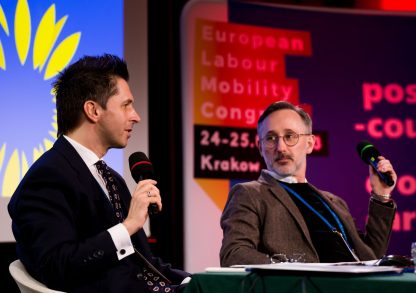Today, the CJEU will issue an important verdict for all posting companies in the "Polish" case C-422/22 ZUS Branch Toruń, concerning the possibility of cancelling A1 by ZUS. Marcin Kiełbasa prepared an expert commentary on the case for Editor. Karolina Topolska in Dziennik Gazeta Prawna.
Thousands of companies and employees, who have cases in the courts for the cancellation of A1 certificates, are waiting for the ruling, which will be handed down tomorrow at the Luxembourg tribunal. After the EU court's ruling, they may return to Social Security.
Marcin Kiełbasa, Doctor of Law, legal counsel, assistant professor in the Department of Public Economic Law and Labor Law at the Cracow University of Economics, legal advisor in European Labour Mobility Institute, notes that in this particular case, in which questions were referred to the CJEU, the practical effect of consultations would probably come down to the fact that the competent institution in France, traditionally reluctant to post, would most likely agree with the position of ZUS. - However, in other cases of this kind, carrying out possible mandatory consultations or arrangements could in practice prevent a person from "falling outside" the scope of insurance coverage, Dr. Marcin Kielbasa says. The expert believes that their effect could be to change the position of the sending country's institution (e.g., Poland), or at least to induce all the institutions concerned to use the exceptional agreement of Article 16(1) of Regulation 883/2004. "Such an agreement allows the determination of the applicable social insurance legislation in a different way than would result from the application of the relevant provisions of the regulation," he explains.
In the event that an employee is excluded from the originally established social security system, such as the Polish one, which most often occurs retroactively, such a person must retroactively be reported to social security in the country that proved ultimately competent - such as France. Insurance premiums should also be paid there. At least in theory.
However, there is a risk that the worker in question will not be covered by social security. This was pointed out by the Polish government in the proceedings before the Tribunal
– reports Marcin Kiełbasa.
As he points out, the first issue is the obligation of the state considered retroactively competent (here France) to apply its entire legislation. This results, for example, in the need to take into account the limitation periods concerning possible retroactive social security coverage. - Thus, it may happen that a person is excluded from the legislation of the sending state and at the same time cannot, due to the expiry of a given period, e.g. five years, be covered by the legislation of the host state, notes the lawyer.
Furthermore, in some EU Member States, the retroactive declaration of a person to social security does not occur ex officio, but requires the active (co-)action of the employer.
Due to the passage of time, it may turn out that the employer no longer exists or that it is impossible to contact him or her - making it impracticable to cover the social security of the retrospectively considered competent state
- notes Dr Marcin Kiełbasa. As he adds, there is also the risk of a failure to conclude an exception agreement (institutions are not obliged to do so) or, finally, the inaction of the competent institution. - Depriving a person of insurance cover, on the other hand, blatantly violates EU internal market law and the objectives of Regulation 883/2004, Dr Marcin Kiełbasa believes. The expert also fears that the CJEU's ruling, although it will concern A1 withdrawn ex officio, may be an impulse for some foreign institutions to ignore consultation procedures also where they are obligatory.
The entire article on Dziennik Gazeta Prawna
About the European Labour Mobility Institute
The European Labour Mobility Institute is Europe's largest think tank on the posting of workers. We bring together entrepreneurs, academics, lawyers and civil servants to create Poland's only and Europe's largest expert knowledge forum on the posting of workers. We take action to improve the applicable law and its correct interpretation and to stop cases of discrimination against Polish employers and their posted workers. We provide our members with access to current information and expertise. more >>>








